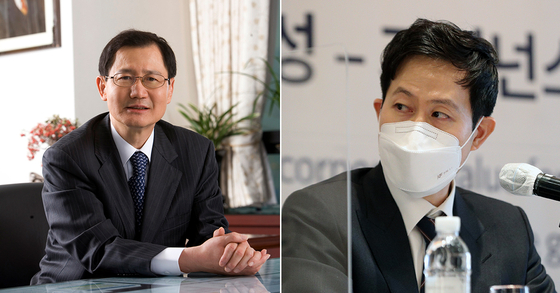
Park Chan-gu, Chairman Kum Ho Seok-hwa (left) and Park Cheol-wan, Managing Director JoongAng PhotoㆍNews 1
The dispute over the management rights of Kumho Petrochemical, referred to as the’nephew’s dilemma’, is turning into a last-minute competition for shareholder votes as the shareholders’ meeting approaches on the 26th. Chairman Park Chan-koo (little father) owns 14.9% of Kumho Petrochemical, and managing director Park Chul-wan (nephew) owns 10.2%, so management leadership may change depending on shareholders’ votes. In particular, the two sides are fiercely competing under water for the support of large hands such as foreigners and the National Pension Service, which can have a decisive influence on the vote among shareholders.
According to the business community on the 15th, it is Chairman Park, who is currently holding management control, who has recently taken an offensive in the management control dispute between the two sides. On the 14th, he received a positive opinion from Chairman Park’s proposal, which included a dividend payment of 4200 won per share (common stock) and the appointment of an executive director for Baek Jong-hoon from the US Institutional Shareholder Services (ISS), a shareholders’ voting right advisory firm. Kumho Petrochemical emphasized that ISS opposed Park’s 11,000 won dividend proposal immediately after the ISS’s decision was made on the grounds that ISS was’Too Aggressive’. Shareholders do not need to follow the ISS opinion. However, Chairman Park expects that a large number of foreign shareholders, up to 30%, will cast the same vote as ISS’s opinion.
On the 15th, managing director Park refuted the ISS decision and took a re-offensive. He criticized, “It seems that ISS has not carefully reviewed the mid-to-long-term growth strategy that the company has laid out before the shareholders’ meeting,” he said. . He then suggested, “Let’s put up all the agendas for the rebirth of the company and hold an open discussion meeting only to increase corporate and shareholder value.” In addition to the agenda for paying a dividend of 11,000 won, Park has also posted a personnel plan in which he will become an executive director at this shareholders’ meeting.
Initially, the agenda for the dividend and director appointment requested by Park was almost impossible to reach at the shareholders’ meeting. This is because the board of directors Kumho Seokhwa did not accept Park’s proposal and put the agenda on the side of Chairman Park to the shareholders’ meeting. Accordingly, Park filed an application for provisional injunction to the court, and the court gave him a hand on the 10th. At the upcoming shareholders’ meeting, shareholders will vote for a proposal between their small father and nephew on the composition of the board of directors as well as the dividend amount.

Ulsan Plant of Kumho Petrochemical. Photo Kumho Petrochemical Homepage
The next step that will affect the votes of Kumho Petrochemical shareholders is another voting rights advisory company Glass Lewis’s opinion. Glass Lewis, the second-largest player in the global voting rights advisory market after ISS, was the place where Cheil Industries and Samsung C&T merged in 2015 with the same opinion (opposite) as ISS. The decision of the National Pension Plan, which holds a 7.9% stake, is also considered a variable that determines the win or loss between uncle and nephew. The National Pension Service plans to open a committee on trustee responsibility before the shareholders’ meeting to make recommendations on which party to vote for.
In the end, the two sides seem to be taking a life and death to capture the title of’Foreigners + National Pension’, which reaches 38%. Managing Director Park Chul-wan said, “We will continue to strive to persuade all shareholders to the end and return greater value to shareholders.” An official from Chairman Park also said, “The current management’s ability is evident from the management performance, which has increased by 103.1% compared to 2019 (3654 billion won). I will present it to you,” he explained.
Reporter Sunwook Choi [email protected]
![]()
